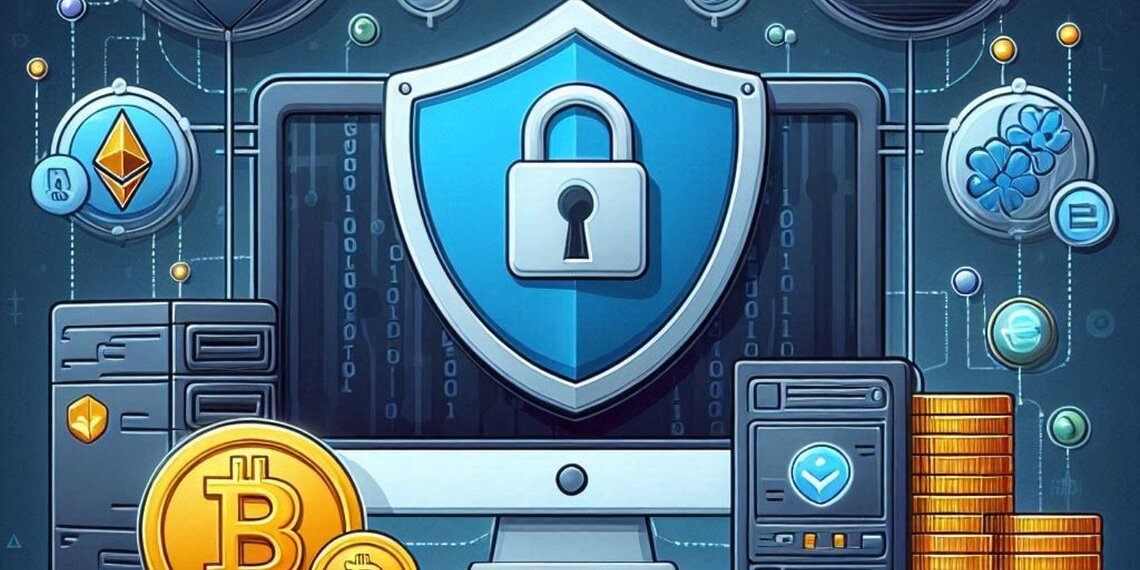Mining cryptocurrency requires a lot of computing power and a secure internet connection. A Virtual Private Network (VPN) can help protect your mining activities from prying eyes and potential cyber threats.
Cryptocurrency mining, while potentially profitable, comes with a unique set of security and privacy considerations. VPNs offer several significant benefits that address these concerns, making them a valuable tool for miners. Here’s how VPNs specifically benefit cryptocurrency mining.
So how does VPNs specifically benefit cryptocurrency mining?
Enhanced Privacy and Anonymity
- IP Address Masking: When you connect to a mining pool or engage in any crypto-related activity, your real IP address is visible. A VPN masks your actual IP address by routing your internet traffic through one of its own servers. This makes it significantly harder for third parties (like your Internet Service Provider, potential hackers, or even government agencies) to link your mining activities directly back to you and your physical location.
- Preventing Surveillance: ISPs can often see your online activities, including connections to mining pools. While they might not see the exact data being exchanged (especially with encrypted connections), they can see that you are connecting to a mining pool. A VPN encrypts all your traffic, making it appear as if you’re just connecting to the VPN server, thus preventing your ISP from monitoring your mining habits.
Increased Security and Protection Against Cyber Threats
- Data Encryption: VPNs create an encrypted tunnel between your device and the VPN server. This means that all data exchanged during your mining operations – including your mining pool credentials, wallet information, and transaction data – is scrambled and unreadable to anyone who might try to intercept it. This is crucial when dealing with valuable digital assets.
- Protection on Public Wi-Fi: If you’re mining (or managing your crypto) on public Wi-Fi networks (which are inherently insecure), a VPN is essential. It safeguards your data from hackers lurking on the same network who could otherwise easily snoop on your activity.
- Mitigating DDoS Attacks: While less common for individual miners, large mining operations or pools can be targets of Distributed Denial of Service (DDoS) attacks. By masking your IP, a VPN can help shield your connection from direct DDoS attacks, making it harder for malicious actors to disrupt your mining uptime.
- Protection Against Cryptojacking (Passive): While a VPN primarily protects your outbound mining, some VPNs offer features (like ad-blockers or malicious site filters) that can indirectly protect you from being cryptojacked. Cryptojacking is when someone secretly uses your computer’s resources to mine cryptocurrency without your permission. By blocking known malicious domains, a VPN can reduce the risk of accidentally visiting a site that attempts to install cryptojacking malware.
Bypassing Geo-Restrictions and Accessing Mining Pools
- Access to Restricted Pools: Some cryptocurrency mining pools or platforms might have geographical restrictions due to regulatory reasons or service availability. A VPN allows you to virtually change your location by connecting to a server in a different country, thereby enabling you to access these otherwise restricted services. This can open up more options for mining pools, potentially leading to better rewards or more stable connections.
- Optimizing Connection to Pools: By connecting to a VPN server geographically closer to your chosen mining pool, you might sometimes experience lower latency (ping), which can slightly improve your mining efficiency, although the impact here is generally less significant than the privacy and security benefits.
Preventing ISP Throttling
- ISPs sometimes throttle (slow down) internet speeds for users engaging in bandwidth-heavy activities like gaming, streaming, or even cryptocurrency mining. Since a VPN encrypts your traffic, your ISP cannot see what you are doing, only that you are connected to a VPN server. This makes it difficult for them to selectively throttle your connection based on your activity, potentially leading to more consistent mining speeds.
A VPN for cryptocurrency mining acts as a digital shield, protecting your identity, securing your data, and providing flexibility in accessing the global mining network. While a good VPN won’t directly increase your mining profits (that depends on your hardware and the market), it significantly enhances the security and privacy of your operation, which is invaluable in the volatile and often targeted world of cryptocurrency.
Here are seven of the best VPN services for cryptocurrency mining.
1. NordVPN
NordVPN is a well-known VPN service with a strong focus on security and privacy. It offers a wide range of servers and robust encryption. Best suited for: Bitcoin, Ethereum
Pros:
- Strong security features
- Large server network
- Fast speeds
Cons:
- Can be more expensive than some other options
- Occasional connection issues reported
2. ExpressVPN
ExpressVPN is another top-rated VPN known for its speed and reliability. It offers excellent security features and a user-friendly interface. Best suited for: Litecoin, Ripple
Pros:
- Fast and reliable connections
- User-friendly interface
- Strong encryption
Cons:
- Relatively expensive
- Limited customization options
3. Surfshark
Surfshark is a budget-friendly VPN that doesn’t compromise on features. It allows unlimited simultaneous connections and offers strong security. Best suited for: Monero, Zcash
Pros:
- Unlimited simultaneous connections
- Affordable pricing
- Good security features
Cons:
- Speeds can be inconsistent
- Smaller server network compared to some competitors
CyberGhost
CyberGhost offers a user-friendly experience with specialized servers for various activities, including torrenting and streaming. Best suited for: Ethereum Classic, Dash
Pros:
- User-friendly interface
- Specialized servers
- Good value for money
Cons:
- Occasional slow speeds
- Some advanced features are lacking
Private Internet Access (PIA)
PIA is a highly customizable VPN with a focus on privacy and security. It offers a wide range of advanced features. Best suited for: Bitcoin Cash, EOS
Pros:
- Highly customizable
- Strong privacy features
- Affordable pricing
Cons:
- Interface can be overwhelming for beginners
- US-based jurisdiction raises some privacy concerns
IPVanish
IPVanish is a VPN that caters to users who need high speeds and strong security. It’s a good option for users who engage in a lot of data-intensive activities. Best suited for: Stellar, Cardano
Pros:
- Fast speeds
- Strong security features
- Good for torrenting
Cons:
- US-based jurisdiction
- Can be expensive
ZenMate
ZenMate is a user-friendly VPN that offers a good balance of features and price. It’s a good option for users who are new to VPNs. Best suited for: TRON, Binance Coin
Pros:
- User-friendly interface
- Affordable pricing
- Good for streaming
Cons:
- Speeds can be inconsistent
- Fewer servers than some competitors
Choosing the right VPN for cryptocurrency mining depends on your specific needs and priorities. Consider factors such as speed, security, server locations, and price when making your decision. All the VPNs listed above are excellent choices, offering a range of features and benefits to enhance your mining experience.
It’s important to note that cryptocurrency remains an unregulated digital asset, not recognized as legal tender, and is subject to market risks. The information provided should not be considered financial or trading advice. CryptoNow holds no responsibility for any investment decisions made based on the content of this article.










